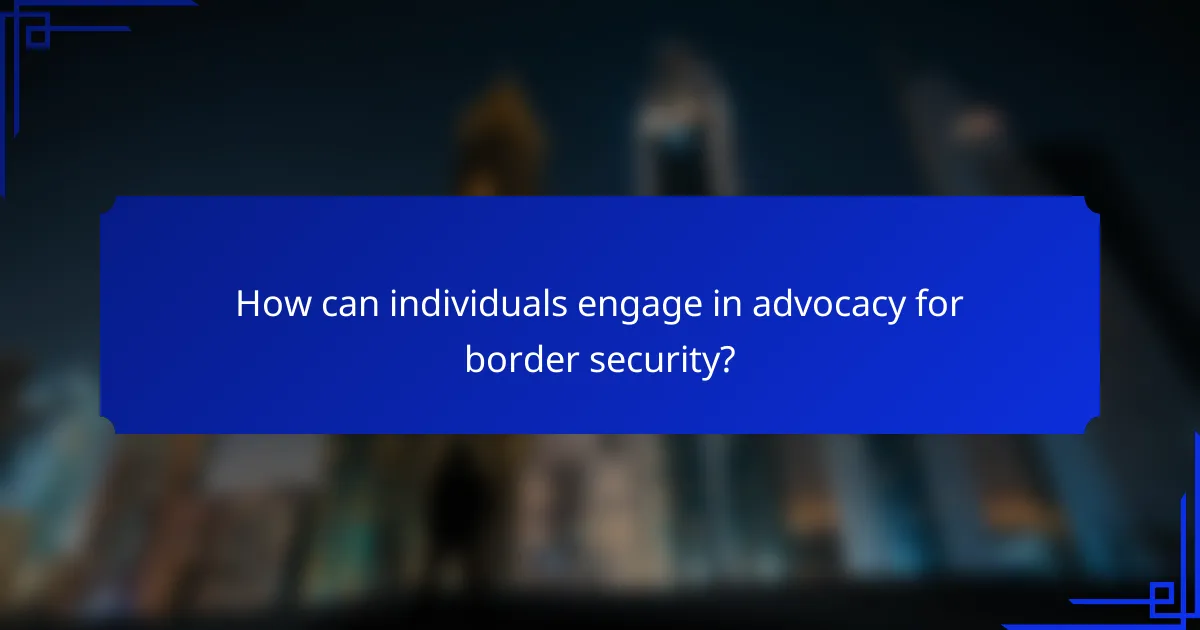Brian Terry’s legacy has profoundly influenced border security policies, emphasizing the critical need for reform and heightened vigilance in law enforcement. His tragic death not only brought attention to the dangers faced by those on the front lines but also spurred legislative advocacy aimed at addressing the complexities of border management and immigration challenges. Through his story, the urgent call for effective policies to ensure safety along the U.S.-Mexico border remains a pivotal issue for lawmakers and communities alike.

How did Brian Terry’s legacy influence border security policies?
Brian Terry’s legacy significantly impacted border security policies by highlighting the urgent need for reform and increased vigilance. His tragic death underscored the risks faced by law enforcement and the complexities of border management, prompting lawmakers to take action.
Increased awareness of border security issues
Brian Terry’s story brought national attention to the challenges of border security, particularly the dangers posed by drug trafficking and illegal immigration. His death served as a catalyst for public discourse, leading to a greater understanding of the issues faced by border patrol agents.
As a result, community organizations and advocacy groups began to mobilize, pushing for more comprehensive discussions around border security. This heightened awareness has led to increased media coverage and public interest in the policies governing border enforcement.
Impact on legislative reforms
The aftermath of Brian Terry’s death prompted significant legislative reforms aimed at improving border security. Lawmakers introduced measures to enhance funding for border patrol and to allocate resources for better training and equipment for law enforcement agencies.
Additionally, reforms focused on addressing the loopholes in existing immigration laws, aiming to create a more cohesive and effective border security strategy. These changes reflect a growing recognition of the need for a balanced approach that considers both security and humanitarian concerns.
Strengthening of law enforcement protocols
In response to the challenges highlighted by Brian Terry’s legacy, law enforcement agencies have strengthened their operational protocols. This includes improved coordination between federal, state, and local agencies to ensure a unified approach to border security.
Agencies have also adopted advanced technologies for surveillance and tracking, allowing for more effective monitoring of border areas. Training programs have been enhanced to prepare officers for the complexities of their roles, ensuring they are equipped to handle the evolving threats at the border.

What legislative advocacy efforts are linked to Brian Terry’s legacy?
Brian Terry’s legacy is closely associated with significant legislative advocacy efforts aimed at enhancing border security and reforming immigration policies. His tragic death highlighted the urgent need for reforms that address both safety and immigration challenges at the U.S.-Mexico border.
Introduction of the Brian Terry Memorial Act
The Brian Terry Memorial Act was introduced to honor the fallen Border Patrol agent and to strengthen border security measures. This act aims to provide additional resources for law enforcement agencies and improve coordination among various federal, state, and local entities involved in border security.
Key provisions of the act include increased funding for surveillance technology and enhanced training programs for border agents. These measures are designed to prevent similar tragedies and ensure that agents have the tools necessary to perform their duties safely and effectively.
Support for comprehensive immigration reform
Brian Terry’s legacy also spurred support for comprehensive immigration reform, emphasizing the need for a balanced approach that addresses both security and humanitarian concerns. Advocates argue that reform should include pathways to legal status for undocumented immigrants while ensuring robust border enforcement.
Proponents of reform suggest that a well-structured immigration system can help reduce illegal crossings and enhance national security. They recommend measures such as increased visa options for skilled workers and streamlined processes for asylum seekers, which can alleviate pressure on border resources and improve overall immigration management.

What are the key aspects of border security in relation to Brian Terry’s story?
Brian Terry’s story highlights critical elements of border security, particularly the enforcement roles and challenges faced by agencies like the Border Patrol. His tragic death underscored the need for effective policies and practices to ensure safety and security along the U.S.-Mexico border.
Role of the Border Patrol in enforcement
The Border Patrol is primarily responsible for preventing illegal immigration and smuggling activities along the U.S. borders. They conduct surveillance, apprehend individuals attempting to cross illegally, and collaborate with other law enforcement agencies to enhance border security.
Agents utilize various tools, including surveillance technology and patrol vehicles, to monitor border areas. Their efforts are crucial in maintaining the integrity of U.S. borders and protecting communities from potential threats.
Challenges faced by border security agencies
Border security agencies encounter numerous challenges, including limited resources, difficult terrain, and evolving tactics used by smugglers. These factors can hinder effective enforcement and response times, complicating the mission of securing the border.
Additionally, political and social pressures often influence border security policies, leading to debates over resource allocation and enforcement strategies. Agencies must navigate these complexities while striving to fulfill their mandate effectively.

How can individuals engage in advocacy for border security?
Individuals can engage in advocacy for border security by actively participating in community efforts and communicating with their elected representatives. This involvement can take many forms, including joining local organizations and directly contacting legislators to express support for specific policies.
Joining local advocacy groups
Joining local advocacy groups focused on border security is a practical way to make a difference. These organizations often organize events, campaigns, and educational initiatives that raise awareness about border issues and promote effective policies.
To find a group, consider searching online for organizations in your area or attending community meetings. Many groups welcome new members and provide training on advocacy techniques, making it easier for individuals to get involved.
Contacting legislators for support
Contacting legislators is crucial for advocating border security. Individuals can express their views through emails, phone calls, or in-person meetings, emphasizing the importance of specific policies or legislation.
When reaching out, be clear and concise about your position. Providing personal stories or data can strengthen your message. Remember to follow up to ensure your voice is heard and to encourage ongoing dialogue with your representatives.

What are the current trends in border security legislation?
Current trends in border security legislation focus on enhancing funding, leveraging technology, and addressing immigration reform. Policymakers are increasingly prioritizing measures that strengthen border enforcement while balancing humanitarian concerns.
Increased funding for border security initiatives
Legislative bodies are allocating more resources for border security initiatives, reflecting a commitment to enhance safety and enforcement. This funding often supports personnel, infrastructure, and operational costs associated with border management.
For example, recent budgets have seen increases in billions of USD dedicated to hiring additional border patrol agents and improving facilities. Stakeholders should monitor appropriations closely, as these funds can significantly impact local economies and border communities.
Focus on technology in border enforcement
There is a growing emphasis on utilizing advanced technology for border enforcement, including surveillance systems, drones, and biometric identification. These technologies aim to improve monitoring capabilities and streamline operations at border crossings.
For instance, the integration of artificial intelligence in surveillance systems can enhance threat detection and response times. However, stakeholders must consider the implications of privacy and civil liberties when implementing such technologies.

What can we learn from Brian Terry’s impact on border security?
Brian Terry’s legacy highlights the critical need for enhanced border security measures and the importance of community engagement in these efforts. His tragic death underscored the vulnerabilities at the U.S.-Mexico border and sparked significant legislative advocacy aimed at improving safety and accountability.
Importance of community involvement
Community involvement plays a vital role in shaping effective border security policies. Local residents can provide valuable insights into the challenges they face and collaborate with authorities to develop solutions that address these issues. Engaging communities fosters trust and ensures that security measures are both effective and respectful of individual rights.
Active participation can take various forms, including town hall meetings, local advocacy groups, and partnerships with law enforcement. These initiatives help create a shared understanding of border security challenges and promote collective action to enhance safety.
Need for ongoing legislative support
Ongoing legislative support is essential for implementing and sustaining effective border security initiatives. Policymakers must prioritize funding for border enforcement, technology upgrades, and training for personnel to ensure they can respond effectively to emerging threats. Without sustained political commitment, progress in border security can stall.
Advocacy groups and community leaders should continuously engage with legislators to highlight the importance of border security funding. Regular updates on the situation at the border can help maintain momentum and encourage lawmakers to act decisively.
Future implications for U.S.-Mexico border relations
The future of U.S.-Mexico border relations will likely hinge on how effectively both countries address security concerns while fostering cooperation. Enhanced border security measures can lead to improved safety but must be balanced with respect for human rights and cross-border trade. Collaborative efforts can strengthen ties and promote mutual understanding.
As both nations navigate these complexities, ongoing dialogue and joint initiatives will be crucial. Establishing clear communication channels can help mitigate tensions and facilitate cooperative solutions that benefit both countries in the long run.
